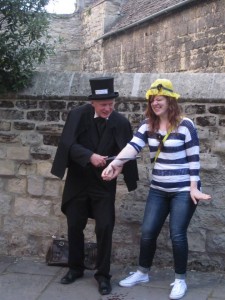On Thursday, day four of the SDP here at University of Oxford, we first heard from the wonderful Caroline Bassett. Her presentation was titled “Are there too many things? Gender and new media.” She is interested in exploring where the terms of digital engagement intersect with gender. She argued that we need to recognize that technologies are still inherently masculine. Although, internet history and feminism have a lot in common. Namely, they are both easily forgotten! Instead of some fight in this time of “post-feminism,” we instead just see a culture of women “leaning in” (Sheryl Sandberg?!). Using social media means necessarily using that which is given instead of communicating more. Resistance is just seen as a political act in this age, and it is implemented often to just gain the celebratory fanfare that comes with the act.
What I loved most about Caroline’s talk was that she pointed out multiple times that our questions are really about the social as noncritical, not about some internet problem. It is our relations that have become a problem, and we thus should not be blaming the technology. Facebook is really big data, not some social space as we would like it to genuinely be. I thought that all of the great points she brought of (all of which I cannot fit here) tied in nicely with my connection between Butler, Althusser, and the way algorithms hail us online more generally, and on Facebook more specifically. This is a weird space, since we almost necessarily must turn to these interpellations as soon as we check in on our News Feeds and Timelines on Facebook. Caroline pointed out that algorithms do not work without people. And this point is so important–just because we talk about the implications of the internet does not mean that we are technological determinists. We must remember, though, that online spaces are conceived, paid for, designed, built, and maintained by people. Therefore, we instead need to understand this co-constitution–how do humans evolve with technology?
Next, Kathryn Eccles explained what the new field of Digital Humanities is. She (and others) completed studies to understand the usage and impact of digital resources. The found that digitizing resources (1)transformed access, (2)enabled new ways of drilling into materials, (3)provided a new means of engaging students, (4)enabled distance learning, and (5)fostered serendipitous discoveries. More to come on this presentation via my contributions to the Temple University Digital Scholarship Center blog!
The first of our student presenters was Josephine Wolff who explores and designs socio-technical defense for computer systems. She works with computer threats and mitigation at MIT. Josephine spoke about some security issues at MIT and the ways that they went about trying to fix both their security issues and their image after the JSTOR and Schwartz case (which, if you don’t remember, tragically ended with Schwartz committing suicide). Types of security include firewall, password complexity, password expiration, and restrictions to off-campus access. Threats include comprised accounts, copyright infringement, compromised hosts, compromised accounts, and unsolicited emails. An interesting example that Josephine explained was cases of very “real” looking unsolicited emails. Clearly, if users believe the email to be real and enter their passwords into the fake site, password complexity and expiration do not matter at all. I enjoyed Josephine bringing a completely different vibe to the SDP. The way that she thinks about a different level of structures and digital spaces allowed for a lot of great conversations between the two of us over the course of the program.
Chris Leeder presented his dissertation work on scaffolding students’ information literacy skills. He helped students to gain information literacy, evaluate online credibility, and learn through computer-supported collaboration through a website that he designed and had programmed. He found that students use a lot of blogs and, notably, first Google results when trying to find information online. I found Chris’ work to be very practical, and he is already getting ready to start a postdoc at Rutgers so congratulations to him!
Last for the day was Gabriel de Seta who presented “What is internet culture?” By exploring China’s every day internet use through anthropological methods, Gabriel concluded that we should no longer use the word culture, but “folklore.” This is because users on sites like YouTube and Tumblr “play with” slang and create a “carnival-like” space that provides an extra space in society to do so.
After our sessions at the OII, we took a kooky, but fun, ghost tour around Oxford. Here I am with a “birthday hat” getting my arm “sliced” by the guide, Bill Spectre. Clearly, it is good that I didn’t go into acting.
After the tour some of us SDPers went for delicious thai!
